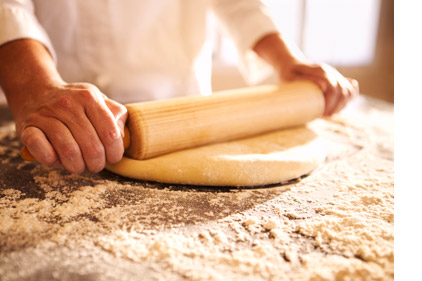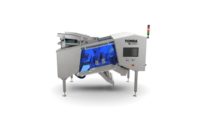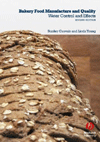The Best 'Buns' in Town

Milano Bakery’s recently expanded 40,000-sq.-ft. production facility mixes skillful manual baking procedures with highly automated production.

Lauren R. Hartman, Editor-in-Chief
Baking fresh, tasty Italian and French bread, dinner rolls, burger and hot dog buns, Kaiser and submarine rolls, Pullman loaves and more for restaurants, supermarkets, casinos, foodservice suppliers and others, Milano Baking Co., Joliet, Ill., known affectionately as the bakery with “the best buns in town,” has seen a lot in 96 years of doing business.
An expansion to the production facility a few years ago was a welcome improvement, adding 20,000 sq. ft. of production and packaging space as well as new production equipment and a bagging line. “So we’re set for the time being,” explains Darin DeBenedetti, vice president of Milano Bakery, Inc., who oversees production and, like his brother Mario, is a third-generation of the family running the business. “But I’m always looking at new equipment that might be a big help to us.”
The plant’s most recent addition was the bagging line installed in the packaging area, the latter of which was made larger in the expansion process. “We’re always trying to position ourselves with larger corporations, and we’re flexible enough to provide a wide variety of things to the seasonal companies here in Joliet, such as the river boats, race tracks and baseball stadiums that need seasonal items for the summer,” he says. “We’ve put quite a lot of food safety and quality measures in place, so we’re a very clean bakery. This new line has helped us out a lot because it’s versatile. We can make several different types of products with it.”
With 50 employees, the bakery churns out fresh, delectable breads, rolls, artisan items, buns and more, some 150 stock-keeping units (SKUs) altogether. Milano’s 91/2 truck routes serve the greater Joliet area, as well as southern Chicago suburbs and occasionally, portions of Indiana. Production starts at 6 a.m. most days and 3 a.m. on Fridays, he says. “We run two shifts a day, five days a week standard and then do cleanings on Tuesdays and come in on Sundays. We can deliver seven days a week, depending on customer requirements. We’re planning on consolidating our truck routes to make them more efficient. That way, we will eliminate a few trucks and maintenance, which will help offset the rising cost of flour and fuel,” DeBenedetti explains.
Producing about 50,000 loaves of fresh bread a week or 65,000 lb. of dough, and products from 1 oz. to 3 lb. in quantity, the baking facility is organized according to function. There are basically three production lines: An automatic “string” line for dinner rolls, bread sticks, submarine rolls, hamburger and hot dog buns, Kaiser rolls and similar items; a bread line for all different loaf sizes up to 3 lb. and a manual, custom line for artisan breads and specialty items for restaurants, Ciabatta breads, focaccia, boules and “just about anything else the customers want,” DeBenedetti says.
At the time of Snack Food & Wholesale Bakery’s visit, the automatic line was producing 4- and 6-in. French rolls and the manual line was making a 4-in. Ciabatta.
“With the added space and upgraded equipment, we’re able to produce more in less time,” DeBenedetti says. “It used to take about six hours to make hot dog and burger buns by hand on a bench. Today, two staff members are able to produce the same amount in 30 min. to an hour. We also no longer have to hand-stretch and cut our French rolls by hand if we don’t want to, thanks to our automatic line.”
A little in every batch
Flour is stored in a large outer silo that holds 90,000 lb. The flour is mixed for almost 10 min. with water, yeast and “a certain amount of the dough starter” in one of two, 600-lb. batch metal mixers. “We keep the starter here all the time,” DeBenedetti says as he points to a large container in the corner. “We add a portion into every batch, which is one reason the flavor of our breads stays the same and the product is consistent. We add something to this starter mixture daily and feed that mixture again before we go home.”
Time and temperature are critical to each batch, he says. After the dough is properly mixed and rests for a time, the mixing bowls are taken over to the new line where the dough is dropped into a hopper leading to a conveyor that moves it into separate belts of the divider, is then stretched, weighed, automatically formed into rolls and placed on pans, 30 per pan. The pans are placed by staffers onto racks that hold 30 pans each. The staffers then move the racks to the proofing area. “We stretch a lot of things on the string line or can do it by hand,” he adds. “But, we fold things like our focaccias by hand.”
Scoring of large round loaves and rolls can also be performed by hand, as is applying toppings like cooked onions, sun-dried tomatoes, herbs and more. “We use a lot of toppings, and presentation is so critical,” DeBenedetti says. “We talk to the chefs at the riverboat casino restaurants and other restaurants that change their menus often to find out what they’d like. We use things like seeds and cheeses, tomatoes, herbs and pestos. The restaurants ask for various things. We’re seeing the trend toward wheat and multigrain breads, which has been big for the last few years. We also notice more demand for brioche buns and pretzel buns and now we make a brioche/pretzel roll combination.”
New bread and roll shapes are also requested. “We get asked to make things in different shapes-sticks, twists, larger, smaller whatever we can make in a roll, they want to try as a pretzel, we try wheat flours, corn flours and others,” he says.
The racks are placed in the proof box (or can be put into a retarder for 12 hours, depending on the product), and stay there for an hour at 80-90°F and 90% RH. Once proofed, the rolls are taken out of the proofer and placed on the racks to be baked in brick-lined revolving ovens at 350-400°F for 8, 12 or 13 min., depending on the product.
The seven brick-lined rack ovens were made in Canada, DeBenedetti notes. Five of the ovens reside in the main production facility and two were installed in the bakery/coffee/pastry shop. “They save 15% on gas usage, so we’ve cut our energy use. And they bake superior artisan breads,” he says. “But they weigh twice as much as a standard rack oven. We have the capacity for two more of them if needed. The ovens bake most products at 350-400°F for 8-13 min., but it depends on the product, its size and customer specifications.”
Next, the racks of rolls are moved to a holding spot near the packaging line where they rest for about 30 min., says DeBenedetti. “If you let bread rise slowly, you have more control in your plant.” Other items can rest up to an hour, depending on what they are, and then head to packaging. Once the rolls are removed from the pans, the pans are cleaned and brought back to the front of the line.
In the case of the French rolls, pans of rolls are dumped on a conveyor leading to the automatic bagging line. The rolls are separated by hand on the conveyor and can be sliced, depending on specifications, either straight through or with a hinge, and are then automatically stacked (usually in a 4x4 configuration) and pass through a metal detector before they’re bagged in clear polyvinyl chloride film. The various products can be bagged in multiples depending on the order, but the eight-pack is the most prevalent.
Printed with the red, green and white Milano logo and bakery information, the bags are automatically clipped closed with a bag closure, loaded onto crates (usually six to 12 bags per crate) and moved into a holding area. After the bagged rolls are inspected, the staff checks what truck route they will be placed and the crates are loaded into trucks.
Long breads and specialty breads and rolls that don’t fit into the clear bags are packed by hand in white paper sacks printed with the red, white and green Milano logo.
The Milano staff inspects the products and monitors each operation constantly. “We perform hourly quality control checks and weigh everything on stand-alone weigh scales over by the divider (on this line),” DeBenedetti points out. “We have two cleanings during the week, a full washdown on Tuesdays, which is our down day and each night, we clean the heads and sanitize everything-the mixers, the cutter/slicers, the dividers, everything. So, we have been ahead of the new food safety regulations.”
Milano is well known and has been a fixture in the community thanks to its contributions to local food pantries and shelters with donations of extra product. “We send extras to a few places so that it doesn’t go to waste. We’re helping to reduce our carbon footprint,” DeBenedetti points out. Milano also sometimes works with a feed company. Any returned bread is mixed with grain and made into animal feed while some goes into making bread crumbs.
Get it right the first time
The bakery is making other productive efforts, such as working to improve its quality control practices with visual and online inspection processes. “There are a number of visual and online QC checks and inspection processes performed hourly throughout the production process,” DeBenedetti says. “We are training employees on visual product inspection with a new picture program that allows us to compare finished products to a standard and fill out bread scoring sheets for each product. We also use x-ray inspection systems and metal detectors. We monitor the lines by the hour to ensure that everything is going according to plan. And our maintenance crew inspects the machinery regularly to make sure it’s kept clean and running properly, and we check weights, slices and temperatures frequently.”
The bread basically dictates everything that happens, he says. “We try to stay as efficient as possible. Everyone must stay on task, so if we start something, we finish it. And we take our time as much as we can. The more time we take, the better the product. We don’t want to have to bake a product over again; we want to make sure it’s done right the first time.”
Being what the DeBenedettis call “a middle-of-the-road” bakery in size-not too small and not too large-the production plant is faced with challenges on a daily basis. But its strong family ties and firm work ethic keep things running smoothly. “There are few breathers,” DeBenedetti continues. “There’s always something we have to fight for, whether the high costs of gasoline and commodities or operating costs. But we love what we do and have been with each other a long time, with good people around us. If we can stay ahead of the economy, we’ll be okay.”
Some of the fourth-generation children in the family now work at the bakery, including DeBenedetti’s son and daughter. “They’re carrying the torch and continuing on. If I could just pay them with bread, I’d be happy,” he laughs.

Lauren R. Hartman, Editor-in-Chief
Baking fresh, tasty Italian and French bread, dinner rolls, burger and hot dog buns, Kaiser and submarine rolls, Pullman loaves and more for restaurants, supermarkets, casinos, foodservice suppliers and others, Milano Baking Co., Joliet, Ill., known affectionately as the bakery with “the best buns in town,” has seen a lot in 96 years of doing business.
An expansion to the production facility a few years ago was a welcome improvement, adding 20,000 sq. ft. of production and packaging space as well as new production equipment and a bagging line. “So we’re set for the time being,” explains Darin DeBenedetti, vice president of Milano Bakery, Inc., who oversees production and, like his brother Mario, is a third-generation of the family running the business. “But I’m always looking at new equipment that might be a big help to us.”
The plant’s most recent addition was the bagging line installed in the packaging area, the latter of which was made larger in the expansion process. “We’re always trying to position ourselves with larger corporations, and we’re flexible enough to provide a wide variety of things to the seasonal companies here in Joliet, such as the river boats, race tracks and baseball stadiums that need seasonal items for the summer,” he says. “We’ve put quite a lot of food safety and quality measures in place, so we’re a very clean bakery. This new line has helped us out a lot because it’s versatile. We can make several different types of products with it.”
With 50 employees, the bakery churns out fresh, delectable breads, rolls, artisan items, buns and more, some 150 stock-keeping units (SKUs) altogether. Milano’s 91/2 truck routes serve the greater Joliet area, as well as southern Chicago suburbs and occasionally, portions of Indiana. Production starts at 6 a.m. most days and 3 a.m. on Fridays, he says. “We run two shifts a day, five days a week standard and then do cleanings on Tuesdays and come in on Sundays. We can deliver seven days a week, depending on customer requirements. We’re planning on consolidating our truck routes to make them more efficient. That way, we will eliminate a few trucks and maintenance, which will help offset the rising cost of flour and fuel,” DeBenedetti explains.
Producing about 50,000 loaves of fresh bread a week or 65,000 lb. of dough, and products from 1 oz. to 3 lb. in quantity, the baking facility is organized according to function. There are basically three production lines: An automatic “string” line for dinner rolls, bread sticks, submarine rolls, hamburger and hot dog buns, Kaiser rolls and similar items; a bread line for all different loaf sizes up to 3 lb. and a manual, custom line for artisan breads and specialty items for restaurants, Ciabatta breads, focaccia, boules and “just about anything else the customers want,” DeBenedetti says.
At the time of Snack Food & Wholesale Bakery’s visit, the automatic line was producing 4- and 6-in. French rolls and the manual line was making a 4-in. Ciabatta.
“With the added space and upgraded equipment, we’re able to produce more in less time,” DeBenedetti says. “It used to take about six hours to make hot dog and burger buns by hand on a bench. Today, two staff members are able to produce the same amount in 30 min. to an hour. We also no longer have to hand-stretch and cut our French rolls by hand if we don’t want to, thanks to our automatic line.”
A little in every batch
Flour is stored in a large outer silo that holds 90,000 lb. The flour is mixed for almost 10 min. with water, yeast and “a certain amount of the dough starter” in one of two, 600-lb. batch metal mixers. “We keep the starter here all the time,” DeBenedetti says as he points to a large container in the corner. “We add a portion into every batch, which is one reason the flavor of our breads stays the same and the product is consistent. We add something to this starter mixture daily and feed that mixture again before we go home.”
Time and temperature are critical to each batch, he says. After the dough is properly mixed and rests for a time, the mixing bowls are taken over to the new line where the dough is dropped into a hopper leading to a conveyor that moves it into separate belts of the divider, is then stretched, weighed, automatically formed into rolls and placed on pans, 30 per pan. The pans are placed by staffers onto racks that hold 30 pans each. The staffers then move the racks to the proofing area. “We stretch a lot of things on the string line or can do it by hand,” he adds. “But, we fold things like our focaccias by hand.”
Scoring of large round loaves and rolls can also be performed by hand, as is applying toppings like cooked onions, sun-dried tomatoes, herbs and more. “We use a lot of toppings, and presentation is so critical,” DeBenedetti says. “We talk to the chefs at the riverboat casino restaurants and other restaurants that change their menus often to find out what they’d like. We use things like seeds and cheeses, tomatoes, herbs and pestos. The restaurants ask for various things. We’re seeing the trend toward wheat and multigrain breads, which has been big for the last few years. We also notice more demand for brioche buns and pretzel buns and now we make a brioche/pretzel roll combination.”
New bread and roll shapes are also requested. “We get asked to make things in different shapes-sticks, twists, larger, smaller whatever we can make in a roll, they want to try as a pretzel, we try wheat flours, corn flours and others,” he says.
The racks are placed in the proof box (or can be put into a retarder for 12 hours, depending on the product), and stay there for an hour at 80-90°F and 90% RH. Once proofed, the rolls are taken out of the proofer and placed on the racks to be baked in brick-lined revolving ovens at 350-400°F for 8, 12 or 13 min., depending on the product.
The seven brick-lined rack ovens were made in Canada, DeBenedetti notes. Five of the ovens reside in the main production facility and two were installed in the bakery/coffee/pastry shop. “They save 15% on gas usage, so we’ve cut our energy use. And they bake superior artisan breads,” he says. “But they weigh twice as much as a standard rack oven. We have the capacity for two more of them if needed. The ovens bake most products at 350-400°F for 8-13 min., but it depends on the product, its size and customer specifications.”
Next, the racks of rolls are moved to a holding spot near the packaging line where they rest for about 30 min., says DeBenedetti. “If you let bread rise slowly, you have more control in your plant.” Other items can rest up to an hour, depending on what they are, and then head to packaging. Once the rolls are removed from the pans, the pans are cleaned and brought back to the front of the line.
In the case of the French rolls, pans of rolls are dumped on a conveyor leading to the automatic bagging line. The rolls are separated by hand on the conveyor and can be sliced, depending on specifications, either straight through or with a hinge, and are then automatically stacked (usually in a 4x4 configuration) and pass through a metal detector before they’re bagged in clear polyvinyl chloride film. The various products can be bagged in multiples depending on the order, but the eight-pack is the most prevalent.
Printed with the red, green and white Milano logo and bakery information, the bags are automatically clipped closed with a bag closure, loaded onto crates (usually six to 12 bags per crate) and moved into a holding area. After the bagged rolls are inspected, the staff checks what truck route they will be placed and the crates are loaded into trucks.
Long breads and specialty breads and rolls that don’t fit into the clear bags are packed by hand in white paper sacks printed with the red, white and green Milano logo.
The Milano staff inspects the products and monitors each operation constantly. “We perform hourly quality control checks and weigh everything on stand-alone weigh scales over by the divider (on this line),” DeBenedetti points out. “We have two cleanings during the week, a full washdown on Tuesdays, which is our down day and each night, we clean the heads and sanitize everything-the mixers, the cutter/slicers, the dividers, everything. So, we have been ahead of the new food safety regulations.”
Milano is well known and has been a fixture in the community thanks to its contributions to local food pantries and shelters with donations of extra product. “We send extras to a few places so that it doesn’t go to waste. We’re helping to reduce our carbon footprint,” DeBenedetti points out. Milano also sometimes works with a feed company. Any returned bread is mixed with grain and made into animal feed while some goes into making bread crumbs.
Get it right the first time
The bakery is making other productive efforts, such as working to improve its quality control practices with visual and online inspection processes. “There are a number of visual and online QC checks and inspection processes performed hourly throughout the production process,” DeBenedetti says. “We are training employees on visual product inspection with a new picture program that allows us to compare finished products to a standard and fill out bread scoring sheets for each product. We also use x-ray inspection systems and metal detectors. We monitor the lines by the hour to ensure that everything is going according to plan. And our maintenance crew inspects the machinery regularly to make sure it’s kept clean and running properly, and we check weights, slices and temperatures frequently.”
The bread basically dictates everything that happens, he says. “We try to stay as efficient as possible. Everyone must stay on task, so if we start something, we finish it. And we take our time as much as we can. The more time we take, the better the product. We don’t want to have to bake a product over again; we want to make sure it’s done right the first time.”
Being what the DeBenedettis call “a middle-of-the-road” bakery in size-not too small and not too large-the production plant is faced with challenges on a daily basis. But its strong family ties and firm work ethic keep things running smoothly. “There are few breathers,” DeBenedetti continues. “There’s always something we have to fight for, whether the high costs of gasoline and commodities or operating costs. But we love what we do and have been with each other a long time, with good people around us. If we can stay ahead of the economy, we’ll be okay.”
Some of the fourth-generation children in the family now work at the bakery, including DeBenedetti’s son and daughter. “They’re carrying the torch and continuing on. If I could just pay them with bread, I’d be happy,” he laughs.
Looking for a reprint of this article?
From high-res PDFs to custom plaques, order your copy today!









